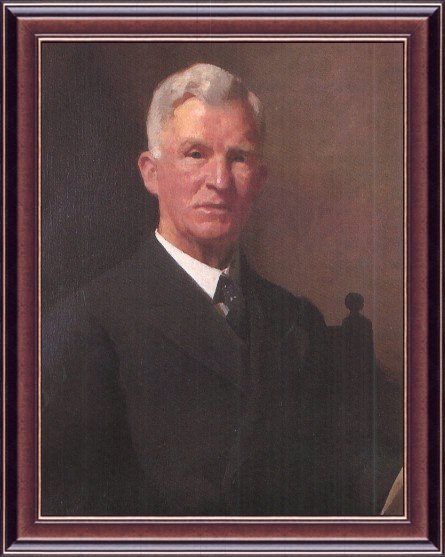
13th PRIME MINISTER
22 OCT 1929 - 6 JAN 1932

Renowned for his fine voice, imaginative oratory and well-ordered arguments.
Thirteen was certainly an unlucky number for Jim Scullin. As the 13th Prime Minister, and first Labor man in the top job for 13 years, he stepped into power just as the Great Depression began to savage everyone's hopes and dreams.
Scullin was one of the Irish Catholics, inspired by Archbishop Mannix's opposition to 'England's war', who held the Labor Party together after Hughes and his henchmen defected.
His father, an Irish immigrant, was a railwayman at Trawalla near Ballarat. Scullin, born there in 1876, had the classic beginnings for a Labor man of that era. He left school at about 12, toiled in jobs such as farmhand, woodcutter, surface worker on a goldmine and grocery assistant, and continued to educate himself. The Catholic Young Men's Society helped in his studies, and membership of a debating society honed an Irish talent for public speaking. He was to become renowned for his fine voice, imaginative oratory and well-ordered arguments.
Probably his voice was his most striking physical endowment. He developed into a neat, slender, sandy young man, unremarkable except for the ‘cocky’s curl' of hair which cartoonists later exaggerated. As a teetotaller, non-smoker and devout Catholic, he had little taste for idle socialising. He always lived simply and his manner seemed reserved and even cold. But this masked a keen, sensitive and generous intellect.
A meeting with Tom Mann, the English socialist, and marriage to a girt from a family of union activists, consolidated a youthful attraction to the Labor cause. He was a founder-member of the local Labor Party branch and soon became a full-time union organiser. In 1906 he blooded himself politically with an unsuccessful bid for Deakin's seat of Ballarat, then won the seat of Corangamite. But he lost it again in 1913 and spent the next few years as union organiser, editor of a Labor newspaper and anti-conscription activist.
In 1921 he sponsored the Socialist Objective resolution at a Labor conference, a move passionately condemned by conservatives. But Labor had little hope of government and Scullin had to work patiently to win the seat of Yarra and become first deputy leader and then leader of the party. In October 1929 he led the victory over the Bruce-Page coalition.
Labor regained power full of brave aspirations. The Australian Broadcasting Commission came into being under the Scullin administration and he insisted that Isaac Isaacs should be appointed as the first Australian-born Governor General - but the side-effects of the Depression overwhelmed most Labor plans for progress and reform.
The flow of British capital to Australia suddenly stopped and the states could barely pay the interest on existing loans. Premier Jack Lang, the ‘Big Fella’ of New South Wales, demanded a drop in interest rates and deferment of payments so that his government might help countless families in dire distress. Eventually he stopped payment and was dismissed from office. Scullin's government took over the repayments and responded to Bank of England demands by organising the Premiers' Plan of massive spending cuts which slashed social services.
In this situation, Scullin had only two colleagues with previous ministerial experience: Joseph Lyons and 'Red Ted' Theodore, who had been Premier of Queensland. Scullin appointed Theodore Treasurer, but he had to resign when a Royal Commission accused him of financial skulduggery while he had been Premier. Lyons became Acting Treasurer.
But when the Queensland government dropped the case against Theodore, Scullin reappointed him Treasurer. Lyons, who was known as ‘Honest Joe' ' disliked and distrusted 'Red Ted' and soon crossed swords with him over his financial policies. Eventually Lyons led a splinter group away from Labor.
Scullin found himself caught between a hostile Senate, a caucus split into a right wing which supported him and radical 'Langites' who opposed him, the Lyons group and an Opposition thirsting for his political blood. Colleagues saw his hair turn snow-white in the conflict of loyalties and demands. Caucus discipline fell apart and Labor could do little to help a nation staggering under the impact of the Depression.
When the House, including the Lyons group, passed a motion of no confidence, Scullin feared Labor would split into left- and right-wing parties. He advised the Governor-General to dissolve Parliament and, in the subsequent elections, the United Australia Party swept into power.
Scullin continued as leader of the Labor Party until 1935 and he worked devotedly for the party until his death in 1953. His unofficial epitaph was: 'He chose the wrong time to be Prime Minister.'

http://www.oocities.org/CapitolHill/5557/scullin.html
This page last updated on 01 Feb 01
© Robertsbridge and Langlen
The following advertising was randomly placed by GeoCities,
and does not necessarily reflect
my personal interests, attitudes, opinions, or endorsements.
But it DOES keep those annoying pop-up ads off of my pages!
THANK YOU FOR STOPPING BY!